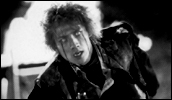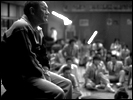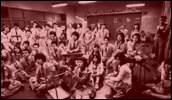Battle Royale
- Year
- 2000
- Original title
- Batoru Rowaiaru
- Japanese title
- バトル・ロワイアル
- Director
- Cast
- Running time
- 113 minutes
- Published
- 9 April 2001



by Tom Mes
It's been a long time since a Japanese film managed to make headlines in the mainstream Western press. The furor over Battle Royale reverberated across the globe, creating a buzz which, in the commercial sense, certainly hasn't done the film any harm. In Japan too, Kinji Fukasaku's battle first with the censors and subsequently with parliament (as detailed in our interview with the director), helped boost audience numbers. A mere month after the film had finished its theatrical run, a new 'special edition' version was released, toning down some of the violence in order to achieve a lower rating. With young teenagers now finally allowed to see the film, the new version again played to substantial crowds.
Based on the novel by Takami Koshun, Battle Royale is a thought-provoking tale of 'what if…?'. The film is set in a near-future Japan where the government's concerns about juvenile delinquency and the youth's disregard for discipline and order have paved the way for extreme measures: the methodical extermination of teenage children. The method: groups of high school children are systematically kidnapped and brought to a deserted island. They are given weapons and food and an order: to go out and kill each other. The last one standing is allowed back into society.
It's a brutal premise and what follows is inevitably a brutal film. Fukasaku never has pulled any punches when it comes to showing violence on screen, and this time around it comes bloodier than ever. This has prompted some to judge the film as little more than a stylised blood bath, a Friday the 13th with guns and younger victims.
However, there is a lot going on beneath the crimson-soaked surface. Fukasaku questions a society by extrapolating its phenomena. He presents us with a Japan whose anger over violent youth has gone so far overboard that the solutions are worse than the problem. In fact, it breeds what it intends to destroy, forcing these children to wreak more havoc upon each other in three days, than they could ever wreak upon society in a lifetime's worth of delinquency. Reactionary politics destroy rather than create, seems to be Fukasaku's message. The young here are the scapegoats for the problems of a country that suffers from an overdose of luxury. It has to create its own crises. The army no longer fights foreign aggressors, but its own children.
Fukasaku's reasons for making the film are more than concern over politics and society. The story of fifteen-year-olds caught in a crisis situation mirrored his own experiences during and just after World War II. At age 15, Fukasaku was working in a factory that was a regular target for Allied bombing raids. There, he said, he learned what happens to friendship in a life-threatening situation. In trying to project these experiences onto a story about today's youth one inevitably encounters a generation gap. Yet, the director's empathy for his young characters is remarkable, all the more for the 55-year age difference between them. There is not a trace of the pedantic "I can tell you didn't experience the war"-attitude with which a generation attempted to alleviate their shared trauma by laying it on the shoulders of their children and grandchildren. Fukasaku has always taken the side of the downtrodden against those in power.
Still, to bridge the generational divide, the director brought in his own twenty-something son Kenta to write the screenplay. When Kenta Fukasaku was himself a teenager in the early 1990s, Japan's economic bubble burst and the country's social fabric came apart. The phenomenon of a job for life, which was such an integral feature of the economic miracle, virtually disappeared overnight. As a result, the whole educational system that groomed the nation's youth for this one goal lost its meaning. An entire generation was left with a future like a gaping black hole.
"In the beginning of the new century, the country fell apart. The Japanese economy collapsed, the unemployment rate skyrocketed and all grownups lost their confidence. Children came to feel contempt for their parents, teachers and the authorities. Disorder in classrooms, stabbings of teachers and boycotting of school became a widespread epidemic": Battle Royale's opening words don't describe a future dystopia, but the unraveling social fabric of 1990s Japan.
Battle Royale is a powerful, blood red barrage of a film. Its strengths are undeniable, running no risk from the occasional leaps in narrative logic. In the winter of his career, Fukasaku is still provoking. And he's succeeding more than ever.